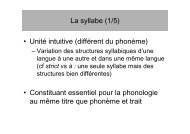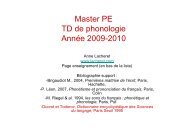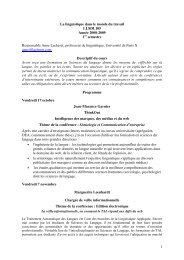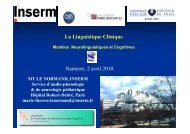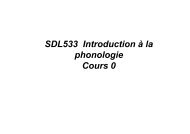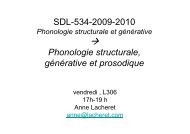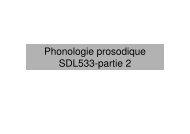You also want an ePaper? Increase the reach of your titles
YUMPU automatically turns print PDFs into web optimized ePapers that Google loves.
are rolled out, as the poet’s voice comes to the fore and recedes, as the actor obtrudes<br />
or vanishes behind her character, as our own self-consciousness rises and ebbs.<br />
III.<br />
Thus in great philosophical plays, the ‘play within a play’ may be especially<br />
telling and is often the point at which the action shifts, where discovery and reversal<br />
precipitate the play’s conclusion. In such dramatic interludes, the poet collects a stageaudience<br />
to witness a staged action, all within the action of the play. That stageaudience<br />
provides a middle term between the figures in the play and the paying<br />
customers in the theater seats. In Doctor Faustus, the pageant of the Seven Deadly<br />
Sins that Faustus witnesses with Mephistophilis, Belzebub and Lucifer is a comic<br />
interlude whose last allegorical figure, Lust, presages Helen, the illusion that damns<br />
Faustus at the very end, as he utters the most memorable lines of the play, and sounds<br />
for all the world like Marlowe: “Was this the face that launched a thousand ships/ And<br />
burnt the topless towers of Ilium?/ Sweet Helen, make me immortal with a kiss./ Her<br />
lips suck forth my soul—see where it flies!/ Come, Helen, come, give me my soul<br />
again.” In Hamlet, the whole play turns on the presentation of The Murder of<br />
Gonzago, which then indirectly precipitates every murder to follow. In The Merchant<br />
of Venice, where Portia is merely acting the role of a lawyer, risking her life to resolve<br />
the conflicts created by the men around her, the court scene is also a play within a<br />
play. In The Tempest, the marriage Masque is the crux of the play, when Prospero<br />
suddenly remembers the almost uncontrollable evil that is about to undo his own<br />
carefully laid plot, and utters the most beautiful lines of the play, perhaps in all of<br />
English literature, where Shakespeare reveals himself as Prospero, as he will again at<br />
the play’s Epilogue.<br />
On the one hand, the interlude intensifies the illusion of the play, because we<br />
the paying customers sit next to, almost next to, those other people in the stage<br />
audience: this makes them more real. We are encouraged to identify the actor with the<br />
role, as if the role were a real person. They witness what we witness, at the same time.<br />
Thus Lucifer, Belzebub, Mephistophilis and Faustus stand beside us as we watch the<br />
pageant of The Seven Deadly Sins; Hamlet, Claudius, and Gertrude sit beside us as we<br />
watch The Murder of Gonzago; and Prospero, Miranda and Ferdinand share our<br />
marvel at the Masque that celebrates marriage.<br />
On the other hand, the interlude undermines the illusion of the play, reminding<br />
us, the ticket-holders, that the play is not real life. If we had been swept up in the<br />
theatrical illusion, dissolved imaginatively in the plot of that second-hand life where<br />
the roles are after all only placeholders and we can so easily insert ourselves, we are<br />
set abruptly back down in our red velvet seats. For the play is only a play: the<br />
characters in the play are bustling about writing and staging a play, in order to remind<br />
us that it is all smoke and mirrors, baseless fabric, insubstantial pageant, rack.<br />
And yet the play within the play must do both. Undermining the illusion of the<br />
play, it brings our own voices to the fore, and reminds us too that the actors are people<br />
like us, who are speaking someone else’s words, for a good reason. Intensifying the<br />
illusion of the play, it lets us hear the poet’s voice, and the stable personages which he<br />
has added to our social world, to whom the actors lend themselves. The result is the<br />
polyphony I invoked earlier.<br />
In Shakespeare and Marlowe’s plays, the polyphony is intensified, given even<br />
more harmonies that underlie, dramatize and nuance the melodic interweaving of<br />
voices, because the plays are written in poetry, the blank verse these two poets<br />
64



